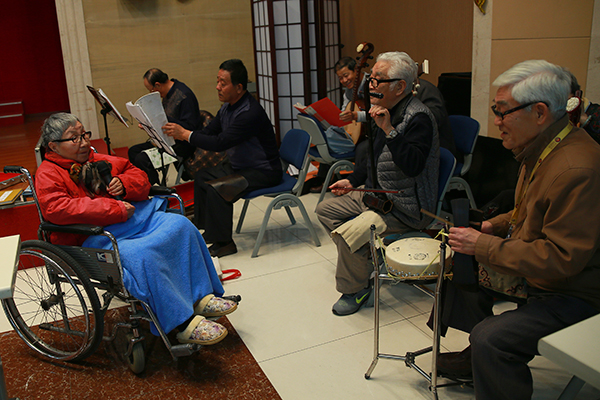Local pension funds will be allowed to invest in stocks
Updated: 2016-11-14 08:03
By Li Xiang(China Daily)
|
|||||||||
 |
|
Pensioners gather for a Peking Opera-based group activities at a pension center in Yanjiao, Hebei province. [Photo/China Daily] |
Low returns on bonds and deposits, plus aging population, raise questions whether they will be able to pay obligations
China will likely officially allow pension funds to be invested in the stock market within this year, with analysts saying the move will help boost market confidence while the long-term impact on risks will only gradually appear in the coming years.
The first batch of provincial governments will be able to sign contracts with the National Council for Social Security Funds within this year, the Ministry of Human Resources and Social Security said earlier.
Under the contracts, the NCSSF, a national social security reserve and a major institutional investor, will invest and manage the funds on behalf of the local governments.
The value of China's pension funds stood at 3.99 trillion yuan ($600 billion) at the of end of last year, according to official data. Regulations allow a maximum 30 percent of the fund's total net assets to be invested in securities, including stocks.
Gao Ting, head of China strategy at UBS Securities, said that the actual amount of capital entering the market initially will not be large and as a typical medium- to long-term funds, the impact on market risk preference is likely to gradually appear in the next few years.
Gao added that the pension funds will likely have real estate and healthcare as their preferred sectors.
For years, China's pension funds could only be invested in low-yield bank deposits and treasury bonds. Between 2008 and 2015, the average rate of investment return by pension funds was only 2.9 percent.
The rapidly aging society in China also poses challenges for the management of the pension funds, sparking concerns on whether the funds would be sufficient to support the aging population.
The government has been reforming the regulations on pension funds, including broadening the permitted investment channels and granting greater investment flexibility.
In 2012, the central government initiated a pilot program to allow the NCSSF to manage the pension funds on behalf of local governments.
Guangdong and Shandong provinces have already received regulatory approval to entrust their pension funds, worth about 200 billion yuan, to the NCSSF for investment in the domestic capital markets.
It is estimated that about 240 to 300 billion yuan will initially enter the market, accounting for less than 1 percent of the overall capitalization of the A-share market.
"The short-term effect will be minimal given that the initial amount of capital will be limited. But, it will help boost investors' confidence and will be positive for big-cap stocks," said Dai Kang, an analyst at Huatai Securities Co Ltd.
Related Stories
More latitude to pension funds will help tackle aging population 2016-10-28 07:52
CPPIB invests in China's western megacity 2016-10-21 19:30
Pension funds cut to bone in more provinces 2016-08-15 16:06
HK regulator steps up efforts against IPO misconduct 2016-11-10 06:52
CIRC cracks down on speculation by insurers 2016-11-09 07:45
Today's Top News
Ceremonies mark 1st anniversary of Paris attacks
Parks look for growth catalyst
China, UK 'golden era' strengthens
UK business calls for a London-only visa system
First Chinese named as new Interpol chief
Chinese-Hungarian Friendship awards presented
Polls missed support for Trump
Superstars party with Jack Ma before shopping spree
Hot Topics
Lunar probe , China growth forecasts, Emission rules get tougher, China seen through 'colored lens', International board,
Editor's Picks

|

|

|

|

|

|







